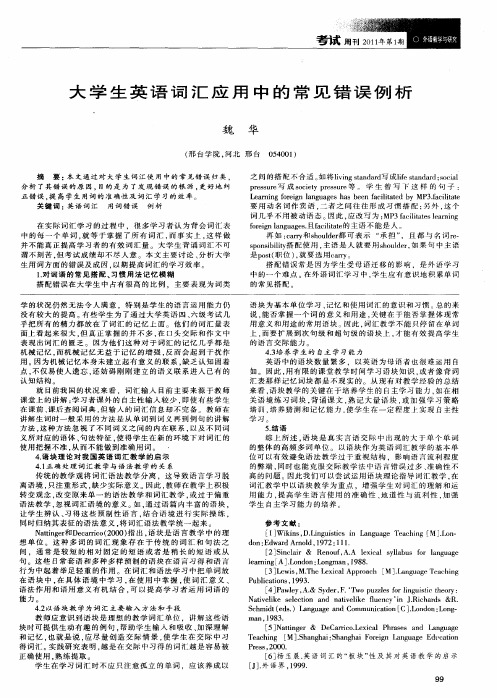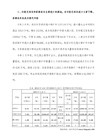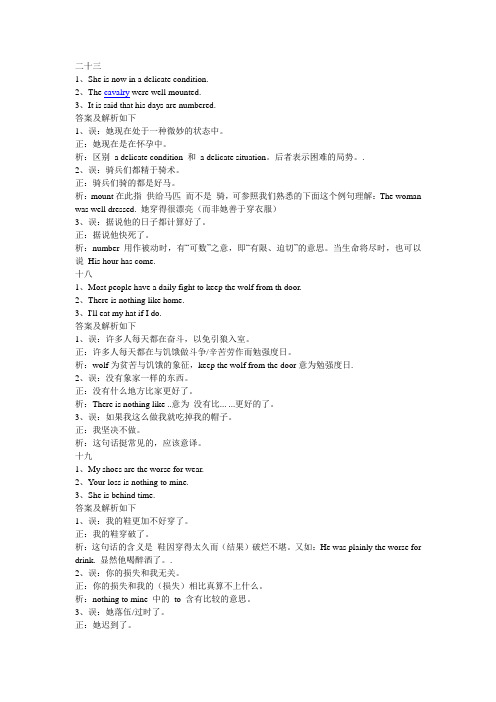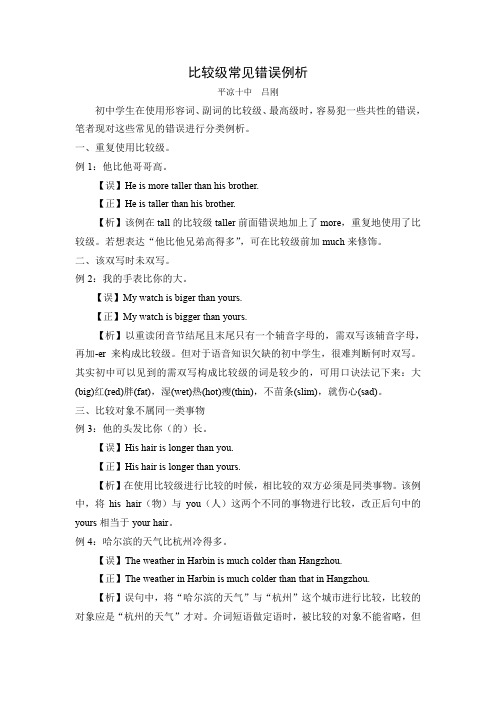英语单词用法常见错误例析
- 格式:doc
- 大小:34.50 KB
- 文档页数:3




初中英语中常见的常见词汇错误在初中英语学习过程中,学生们常常会犯一些常见的词汇错误。
这些错误不仅会影响对语言的理解和使用,还会降低写作和阅读能力。
因此,在学习英语的过程中,我们应该重视并纠正这些错误,提高自己的词汇水平。
本文将针对初中英语中常见的常见词汇错误进行分析和讨论。
一、名词单复数错误在初中英语中,名词的单复数错误是较为普遍的问题。
许多学生会在单数名词前加上"们",或者在复数名词前不加"s"。
例如,“my friends们”、“two book”等等。
正确的说法应为"my friends"和"two books"。
二、动词时态错误动词时态错误也是初中英语学习中常见的错误之一。
常见的错误包括误用一般现在时和一般过去时。
例如,“I go to school yesterday”应改为“I went to school yesterday”,“She plays basketball every day”应改为“She played basketball every day”。
三、形容词和副词误用在初中英语中,形容词和副词的误用也比较常见。
有些学生会误把形容词用作副词的地方,或者反过来。
例如,“I feel bad”应该用副词形式,“I feel badly”,“He speaks quick”应改为“He speaks quickly”。
四、介词错误介词错误也是初中英语中常见的词汇错误之一。
学生们容易把介词与动词、名词搭配错误,造成语义上的混淆。
例如,“I am in the bed”应改为“I am on the bed”,“I am go to school”应改为“I go to school”。
五、冠词误用冠词误用也是初中英语学习中的常见错误。
学生们经常把不定冠词"a"和定冠词"the"使用错误,或者无意识地省略冠词。

二十三1、She is now in a delicate condition.2、The cavalry were well mounted.3、It is said that his days are numbered.答案及解析如下1、误:她现在处于一种微妙的状态中。
正:她现在是在怀孕中。
析:区别a delicate condition 和a delicate situation。
后者表示困难的局势。
.2、误:骑兵们都精于骑术。
正:骑兵们骑的都是好马。
析:mount在此指供给马匹而不是骑,可参照我们熟悉的下面这个例句理解:The woman was well dressed. 她穿得很漂亮(而非她善于穿衣服)3、误:据说他的日子都计算好了。
正:据说他快死了。
析:number 用作被动时,有“可数”之意,即“有限、迫切”的意思。
当生命将尽时,也可以说His hour has come.十八1、Most people have a daily fight to keep the wolf from th door.2、There is nothing like home.3、I'll eat my hat if I do.答案及解析如下1、误:许多人每天都在奋斗,以免引狼入室。
正:许多人每天都在与饥饿做斗争/辛苦劳作而勉强度日。
析:wolf为贫苦与饥饿的象征,keep the wolf from the door意为勉强度日.2、误:没有象家一样的东西。
正:没有什么地方比家更好了。
析:There is nothing like ..意为没有比... ...更好的了。
3、误:如果我这么做我就吃掉我的帽子。
正:我坚决不做。
析:这句话挺常见的,应该意译。
十九1、My shoes are the worse for wear.2、Your loss is nothing to mine.3、She is behind time.答案及解析如下1、误:我的鞋更加不好穿了。

比较级常见错误例析平凉十中吕刚初中学生在使用形容词、副词的比较级、最高级时,容易犯一些共性的错误,笔者现对这些常见的错误进行分类例析。
一、重复使用比较级。
例1:他比他哥哥高。
【误】He is more taller than his brother.【正】He is taller than his brother.【析】该例在tall的比较级taller前面错误地加上了more,重复地使用了比较级。
若想表达“他比他兄弟高得多”,可在比较级前加much来修饰。
二、该双写时未双写。
例2:我的手表比你的大。
【误】My watch is biger than yours.【正】My watch is bigger than yours.【析】以重读闭音节结尾且末尾只有一个辅音字母的,需双写该辅音字母,再加-er来构成比较级。
但对于语音知识欠缺的初中学生,很难判断何时双写。
其实初中可以见到的需双写构成比较级的词是较少的,可用口诀法记下来:大(big)红(red)胖(fat),湿(wet)热(hot)瘦(thin),不苗条(slim),就伤心(sad)。
三、比较对象不属同一类事物例3:他的头发比你(的)长。
【误】His hair is longer than you.【正】His hair is longer than yours.【析】在使用比较级进行比较的时候,相比较的双方必须是同类事物。
该例中,将his hair(物)与you(人)这两个不同的事物进行比较,改正后句中的yours相当于your hair。
例4:哈尔滨的天气比杭州冷得多。
【误】The weather in Harbin is much colder than Hangzhou.【正】The weather in Harbin is much colder than that in Hangzhou.【析】误句中,将“哈尔滨的天气”与“杭州”这个城市进行比较,比较的对象应是“杭州的天气”才对。
英汉翻译常见错误例析A组1、I am now under the weather.2、There are friends and friends.3、The actor has his head turned.答案及解析如下1、误:我现在身处露天之中。
正:我现在不太舒服/我现在醉了。
析:under the weather=ill or depressed;drunk 意为受天气影响而患病;也可表达为喝醉了(多见于澳大利亚英语中)。
2、误:那儿有许多朋友。
正:朋友有许多种,既有益友也有损友。
析:这种表达发一定是为了突出不同种类的,又如:There are shopkeepers and shopkeepers. 商人有好也有坏。
3、误:那个男演员回过了头。
正:那个男演员得意忘形了。
析:have one's head turned/ turn one's head 指因不当的赞扬或意外的成功,使然改变常态。
又如:His success has turned his head (=made him act foolishly)。
同样的表达法还有:The dead body turned her stomach(=made her sick)。
1、She is now in a delicate condition.2、The cavalry were well mounted.3、It is said that his days are numbered.答案及解析如下1、误:她现在处于一种微妙的状态中。
正:她现在是在怀孕中。
析:区别 a delicate condition 和 a delicate situation.后者表示困难的局势……2、误:骑兵们都精于骑术。
正:骑兵们骑的都是好马。
析:mount在此指供给马匹而不是骑,可参照我们熟悉的下面这个例句理解:The woman was well dressed. 她穿得很漂亮(而非她善于穿衣服)3、误:据说他的日子都计算好了。
英汉翻译常见错误例析(9)1、None is so deaf as those who won't hear.2、Those apples are good and ripe.3、He was strong in his time.答案及解析如下1、误:没有比聋子更听不见的人了。
正:没有比不想听的人更聋的了。
析:won't =will not,表示不愿,不想要,含义个人的意志在内。
不能因该用can't。
2、误:那些苹果品质优良并且成熟了。
正:那些苹果是很熟的了。
析:good and 作为副词讲,意思为 very 非常,thoroughly 完全地,同类的表达还有niceand (nicely),rare and(rarely),如:The car was going nice and fast. 汽车跑得相当之快。
3、误:他一生都很强壮。
正:他年青时身体很强壮/健康。
析:in one's time/days 意思为 when he was young/at his best,相反的说法为 at one's age (年老时)英汉翻译常见错误例析(10)1、He measured his length on the floor as soon as heentered the room.2、We searched him to no purpose.3、She succeeded to a large property.答案及解析如下1、误:他一进门就在地板上测量了他的长度。
正:他一进门就摔了一跤,跌倒在地板上。
析:象这种比较幽默的说法,可别太实在了哦。
.2、误:我们漫无目的地寻找他。
正:我们对他进行了搜身,不过一无所获。
析:寻找某人的踪迹,是 search for sb, search sb 意为搜查某人身上,看其是否有违禁品之类。
to no purpose=with no result.3、误:她事业有成,获得了一大笔财产。
英汉翻译常见错误例析汇总英汉翻译常见错误例析汇总1、The enemies were killed to a man.2、The village is on the side of the mountain.3、He never calls a spade a spade .答案及解析如下------------------------------------1、误:敌人被杀得只剩下一个人了。
正:敌人被杀得片甲不留/一个不剩了。
析:(all)to a man =all without exception 全部,一个不剩。
2、误:那村庄在山旁。
正:那村庄在山腰。
析:山有阴阳两面(two sides),说在一面上,其实是指在半山上。
若要指在旁边,即在山下,应该用by the side of 。
3、误:他从不把锄头称作锄头/他从不把黑桃称为黑桃/他指鹿为马。
正:他从不直话直说。
析:call a spade a spade 意为直言不讳。
打桥牌时,手上有什么牌是不直说的,明明手上是黑桃(spade),故意要说为club(梅花)、heart (红桃)或diamond(方块)。
指鹿为马是call white black.1、He is kind to a fault.2、I have a long letter in hand.3、They didn't answer to your explanation.答案及解析如下------------------------------------1、误:他对于错误毫不介意。
正:他太好了/好得过分了。
析:to a fault =excessively 过度、极端地。
2、误:我手上拿着一封长信。
正:我正在写一封长信。
析:have ...in hand 表示be engaged in 正在进行,正在做。
表示手中有...应该是I have a long letter in my hand.3、误:他们没用回应你的解释。
常见的英语语法错误语法是英语考试中的重中之重,所占分值也多。
提高英语力量的方法是多读多练多积累。
我在这里整理了常见的英语语法错误供大家阅读,盼望能关心到您。
常见的英语语法错误1. 检查修饰语是否放在正确的位置上。
例1:a) Without television, people cant get information which comes from other parts of the world immediately.b) Without television, people cant immediately get information which comes from other parts of the world.分析:a) 句子中,immediately 明显放错了位置。
是“得到快速从各地传来的消息”,还是“快速得到从各地传来的消息”?意思模糊不清。
例2:a) At the age of six, my father began to give me English lessons.b) When I was five years old, my father began to give me English lessons.分析:a) 句子,At the age of six 放在这个位置上,变成了“我父亲六岁的时候”。
转变说法,可以解决这个问题。
例3:a) To improve ones writing skill, regular practice is necessary.b) To improve ones writing skill, one must make regular practice.分析:不定式短语的规律主语决不是regular practice,为了把规律关系表达清晰,要么把不定式短语改成If one wants to improve his writing skill,要么把主句改成one must make regular practice.2.表示相同的意思,检查是否使用了平行语法结构。
初中英语单词用法常见错误例析大全a[误] I think it is an useful English dictionary. [正] I think it is a useful English dictionary. [析]在不定冠词 a 与 an 的用法中要注意的一点是:an 用在以元音开头的词之前;而 a 则用在以辅音开头的词之前。
要特别注意的是以 u 字母打头的单词,如 useful,university 等,其第一个音标是[j],所以要特别予以注意。
[误] I need a hour to finish this letter. [正] I need an hour to finish this letter.[析]要注意 hour 和 honest 的第一个字母不发音。
[误] My teacher is a unknown man, but he is a very good man.[正] My teacher is an unk nown man, but he is a very good man.[析]要注意以 u 打头的单词,它的发音为[]时,单数名词前要用 an,如 uncle 等。
[误] There is a“f”in the word“football”.[正] There is an“f”in the word“football”.[析]英文字母单独使用时,如其第一个发音是元音时,其前面的不定冠词应该用 an 而不是 a.[误] I have a little brother. He is a 8 year old boy. [正] I have a little brother. He is an 8 year old boy.[析]要注意这些字母的第一个发音为元音,如 eight, eleven 等。
able[误] This bike is able to be repaired. [正] This bike can be repaired. [析] be able to 主要表达某事或某人具有某种能力去作某事,应译为“有本领”、“有能力”、“可以”作某事,如:I'm able to swim across this river. 而 can 可以用来表示具有接受能力或吸收能力。
如:This radio can be repaired here. about[误] This class is about to begin just now. [正] This class is about to begin.[析]要注意 be about to 是“将要”的意思,含有将来时之意,不要与表示过去时的时间状语连用。
另外,be about to 一般用作书面语,对应的口语是 be going to.about, onabout 与 on 都可以作"关于"讲,但却有所不同,例如:This book is about physics. 应译为“这是一本关于物理学的科普读物。
”而:This book is on physics. 则应译为“这是一本物理学方面的专著。
” above[误] The temperature is five degrees over zero. [正] The temperature is five degrees above z ero. [析]表达“在……上方”时,above 与 over 是可以互换的,如:The sky is above(or over)our heads. 但是要表达在垂直方向上的上方时则应用 above 不可用 over,如:The sun has risen above the horizon.[误] There is often thick cloud above the South of China in summer. [正] There is often thic k cloud over the South of China in summer.[析]当表达覆盖之意时,只可用 over 而不能用 above. [误] There is a bridge above the river. [正] There is a bridge over the river. [析]用来表达“从……上方越过”时不能用 above 只能用 over,如:The plane flew over the city. 但要注意 There is waterfall above the bridge. 则应译为“在桥的上游有一个瀑布。
” across[误] He ran across the wood. [正] He ran through the wood. [析] across 是指某一动作在一平面内进行,而 through 则是指该动作在一三维立体空间的运动过程。
如:The man came in through the window. He walked across the square. acrossacross 的主要用法有两个。
其一,意为“对面”,如:There is a school just across the street. 其二,意为“横过”,如:He walked across the street. afraid[误] I dont't afraid of him. [正] I am not afraid of him.[析]要注意“害怕”afraid一词在英语中不是动词,而是形容词,要与 be 动词连用。
after [误] Two weeks after he left. [正] Two weeks later he left. [正] He left after two weeks. [析]要表达“在多少时间之后”,英语中有两种表达法,即:用 later 时,要时间在前,如 three hours later; 而用 after 时要时间在后,如 after three hours。
[误] My father will be back after a few hours. [正] My father will be back in a few hours.[析]受中文的影响,这个介词常常被误用。
当你要表达在一段时间内某个动作可以完成时,一定要用 in,而不能用 after,因为 after 是指在某一时间之后。
例如:This work will be done in two days. 即表明在两天内这一工作一定会做完。
而如用了 after,即表示在两天之后,完成的时间是 after, behindafter 多用于表示顺序的前后,如:She walked in the line after Tom. 或用来表示“追赶”,表示一种动态,如:He ran after Mary. 而 behind 多用于强调先进与落后,如:She is much behind the other girls in sewing. 或者用于表达“迟于”,如:The train was ten minutes behind the time table. 或者与表示静态的动词连用,如:She hid herself behind the flowers. afternoon[误] He worked very hard in a hot afternoon. [正] He worked very hard on a hot afternoon. [析]习惯用的词组 in the afternoon, 如果加入任何修饰词后其前面的介词 in 都要改为 on,不论其修饰词在前还是在后,如:He swam in this river on the afternoon of June lst. 又如:Are you free on Sunday afternoon? against[误] He against me. [正] He is against me.[析]要注意 against 意为“反对”,但它在英文中却不是动词,而是介词,如要讲反对某事或某人时则要加动词 be, 如:He is against somebody/something. against forvar cpro_psid ="u2572954"; var cpro_pswidth =966; var cpro_psheight =120;against 意为“反对”、“不赞成”;而 for 则意为“同意”,为其反意词。
如:Are you for or against the plan? age[误] He is twenty years old of age. [正] He is twenty.[正] He is twenty years old. [正] He is at the age of twenty. ago[误] Tom's father has been dead five years ago. [正] Tom's father died five years ago. [析] ago 意为由说话时算起,若干时间以前。
它只能和一般动词过去时连用,而不要与完成时连用。
[误] Yesterday I met a friend. We didn't see each other for a long time since we left the college twenty years ago.[正] Yesterday I met a friend. We hadn't seen each other for a long time since we left the colleg e twenty years ago.[析]要注意的是在本句是 ago 是用在由 since 引起的从句之中,只是从句应用过去时,但不影响主句的时态。
agree[误] Does the teacher agree to us?[正] Does the teacher agree with us?[误] Does h e agree with our plan?[正] Does he agree with us?[析] agree with 指“同意某人的提议、建议、计划”等。
如果要讲同意某项计划则要用 agree to, 如:Do you agree to the plan? all [误] The old man has two sons. All of them are workers. [正] The old man has two sons. Bo th of them are workers.[析] all 是指三者或以上的全部,而 both 则是指“两者都”。